No products found.
Out of the Flames: The Remarkable Story of a Fearless Scholar, a Fatal Heresy, and One of the Rarest Books in the World by Lawrence and Nancy Goldstone is a narrative retelling of the life, imprisonment and execution of Michael Servetus, a 16th-century Spanish theologian and physician whose writings challenged the orthodoxies of the Roman Catholic Church.
The book interweaves Servetus’ story with the broader historical, cultural, and religious contexts of the Reformation era in which he lived. After failing to find refuge from his persecutors, Servetus was captured, tried, and eventually burned at the stake for heresy. The authors examine the motivations and beliefs of those who participated in Servetus’ persecution, as well as the ways in which his ideas continue to reverberate in modern discussions of religious pluralism and intellectual freedom.
Further, the authors follow the journey of one of the rarest books in the world, the “Christianismi Restitutio” written by Michael Servetus. The book follows the history of this controversial text, which was banned by the Catholic Church as heretical and was instrumental in the persecution of Servetus.
The authors trace the trail of the “Christianismi Restitutio” from its creation by Servetus in the 16th century to its distribution throughout Europe and eventual confiscation by Catholic Church authorities. They also detail how the book was almost lost to history, surviving only because a copy was discovered in the 19th century by a wealthy collector.
The book’s journey through time and across continents serves as a powerful lens through which to examine the religious and political conflicts of the Reformation era, as well as the evolving attitudes towards intellectual freedom and censorship. “Out of the Flames” is not only a gripping tale of one man’s struggle for his beliefs but also a fascinating exploration of the role of books in shaping history and the legacy of a revolutionary thinker.
The early life and education of Servetus
 Servetus was born in Villanueva de Sigena, Spain, in either 1509 or 1511. The book reveals that his father was a notary, and his family was of modest means. Despite this, Servetus showed an early aptitude for learning and was able to secure an education at the University of Saragossa, one of the most prestigious universities in Spain.
Servetus was born in Villanueva de Sigena, Spain, in either 1509 or 1511. The book reveals that his father was a notary, and his family was of modest means. Despite this, Servetus showed an early aptitude for learning and was able to secure an education at the University of Saragossa, one of the most prestigious universities in Spain.
According to the book, Servetus’s studies at the University of Saragossa introduced him to a wide range of intellectual and cultural influences, including humanism, philosophy, and the emerging Protestant movement. Servetus’s willingness to challenge the traditional doctrines of the Catholic Church through his writings and scholarly debates was already apparent during his early years of study.
The authors also detail Servetus’s time studying in Toulouse, France, where he encountered prominent theological figures who would later play a role in his persecution and execution. It was here that Servetus began his work on “Christianismi Restitutio,” the text that would ultimately spark his condemnation as a heretic.
Overall, “Out of the Flames” offers a rich and detailed portrait of Servetus’s early life and education, setting the stage for the dramatic events of his later years. The book highlights his curiosity, immense intellectual ability and independent thinking from an early age and shows how the seeds of his religious and scientific thought were planted during his formative years of learning.
Michael Servetus’ Scholarly Journey
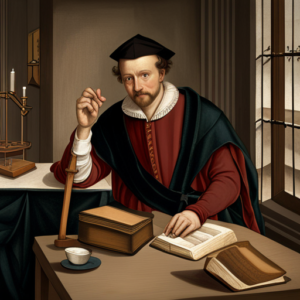 Out of the Flames intimately follows the life and trials of Michael Servetus, a 16th-century Spanish theologian and physician whose controversial views challenged the orthodoxies of the Roman Catholic Church.
Out of the Flames intimately follows the life and trials of Michael Servetus, a 16th-century Spanish theologian and physician whose controversial views challenged the orthodoxies of the Roman Catholic Church.
The authors provide a detailed biographical account of Servetus, tracing his journey from his education in Toulouse to his travels throughout Europe, where he encountered some of the most prominent theologians of his time. Along the way, they examine the ways in which Servetus’s beliefs, which included the rejection of the Holy Trinity and the idea that baptism should be reserved for adults, collided with the prevailing religious and political structures of the day.
The book also details Servetus’s persecution, which included multiple escapes, a ten-year self-imposed exile, and finally, his capture in Geneva and trial for heresy. The authors skillfully blend historical scholarship and narrative storytelling to bring the reader into the world of Servetus, a world where religious dissent was met with violent retribution.
Through Servetus’s story, the authors examine the complex forces of religion, politics, and intellectual freedom that shaped the world of the 16th century. Ultimately, they show how Servetus’s legacy continues to resonate in modern conversations and debates around religious pluralism and individual rights.
Michael Servetus’ love of the Bible as the word of God
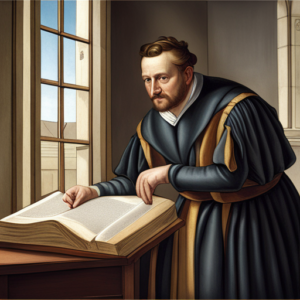 The authors detail Michael Servetus’s love of the Bible and its role in shaping his personal beliefs. Servetus was known for his deep knowledge of the Bible and his belief in its absolute authority, which he contrasted with the complex and sometimes contradictory dogmas of the Catholic Church.
The authors detail Michael Servetus’s love of the Bible and its role in shaping his personal beliefs. Servetus was known for his deep knowledge of the Bible and his belief in its absolute authority, which he contrasted with the complex and sometimes contradictory dogmas of the Catholic Church.
The book provides numerous examples of Servetus’s biblical scholarship and interpretation, including his close readings of passages from the Old and New Testaments that challenged prevailing theological concepts. Servetus believed that the Bible was the ultimate authority in matters of religious doctrine and that its messages were accessible to all thoughtful readers, regardless of their academic or theological training.
According to the book, Servetus saw himself as part of a larger movement of biblical scholars who sought to challenge the established authorities of the Catholic Church, and he believed that his ideas would resonate with others seeking a more direct and personal relationship with God.
The authors argue that Servetus’s love of the Bible was central to his beliefs and his understanding of the world around him. They show how his rebellious interpretation of scripture eventually led to his persecution and execution as a heretic, but they also demonstrate how his ideas continue to influence modern religious discourse.
Overall, “Out of the Flames” offers a compelling portrait of Michael Servetus as a deeply religious figure whose love of the Bible shaped his life and beliefs. The book invites readers to consider the role of scripture in shaping religious thought and illuminates the ways in which Servetus’s ideas continue to resonate in modern discussions of theology and spirituality.
Michael Servetus’ work in translating the Bible
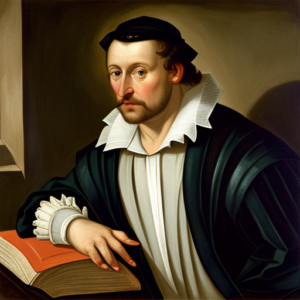 Also highlighted is Michael Servetus’ work in translating the Bible into vernacular languages, a radical act in a time when the Catholic Church discouraged laypeople from reading and interpreting scripture themselves.
Also highlighted is Michael Servetus’ work in translating the Bible into vernacular languages, a radical act in a time when the Catholic Church discouraged laypeople from reading and interpreting scripture themselves.
Servetus believed that the Bible should be accessible to all, and he worked tirelessly to make it available to as many people as possible. He was fluent in several languages, including Latin, Hebrew, and Greek, and he used his linguistic skills to translate the Bible into various vernacular languages, including Spanish.
According to the book, Servetus believed that by making the Bible accessible to ordinary people, he could help to challenge the established authorities of the Catholic Church and allow individuals to develop a more direct and personal relationship with God. His translations sought to cut through the layers of interpretation and commentary that had accumulated around scripture over the centuries and to present the original texts in a clear and straightforward manner.
The authors also show how this work contributed to Servetus’s persecution and execution, as his translations were seen as a threat to the established religious power structures of the time. However, they also highlight the ways in which Servetus’s ideas and translations helped to pave the way for the Reformation and the broader movement towards religious pluralism and individualism.
Overall, “Out of the Flames” offers a fascinating glimpse into Servetus’s work as a Bible translator and the pivotal role that his determination to help all people to read the Bible played in his life and beliefs.
Servetus’ contributions to science
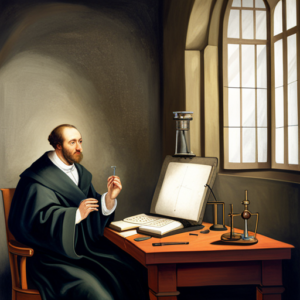 Also well documented in the biography are Servetus’ many contributions to science in addition to his theological work. A trained physician, Servetus made significant strides in the fields of anatomy, physiology, and pharmacology.
Also well documented in the biography are Servetus’ many contributions to science in addition to his theological work. A trained physician, Servetus made significant strides in the fields of anatomy, physiology, and pharmacology.
His groundbreaking work on the anatomy of the lungs challenged the prevailing beliefs of the day and paved the way for the development of modern respiratory physiology. Servetus also made significant contributions to the study of blood circulation and the properties of the heart, as well as the use of plants for medicinal purposes.
According to the book, Servetus saw his scientific work as inseparable from his religious beliefs and his quest to understand the natural world. He believed that God’s creation was a constant source of wonder and that scientific inquiry was a means of unlocking the secrets of the universe.
The authors also note that Servetus’s scientific work was intertwined with his theological writings. He saw no conflict between his scientific discoveries and his religious beliefs, and he used his anatomical and medical knowledge to make theological arguments about the nature of the soul and the human body.
Overall, “Out of the Flames” offers a valuable perspective on Servetus’s scientific contributions and the ways in which these intersected with his theological ideas. The book highlights the depth and breadth of his intellectual curiosity and invites readers to consider the intersections between science and religion, then and now.
Servetus’ maintains integrity to the end
As detailed in the book, in 1553, Servetus was captured in Geneva, where he was put on trial for heresy by John Calvin and other church leaders. Despite his captors’ attempts to extract a confession and recantation, Servetus remained steadfast in his beliefs until the very end.
According to eyewitness accounts, he was abused for weeks in a dungeon and that abuse continued as he was led through the streets of Geneva to his torture stake, which had been piled high with green wood that would burn slowly, thus extending the torturous death as long as possible. All along the route he faced verbal abuse and humiliation and yet refused to kneel before the judges or the executioner, instead standing erect with his head held high. He burned for almost half an hour and moments before expiring cried out “Jesus, Son of the Eternal God, have mercy on me!”.
Servetus’ execution was an important event in the history of religious tolerance and his struggle to maintain his integrity in the face of intense persecution has been an inspiration to many who have faced similar brutality for their faithful adherence to Bible teachings.
The trail of one of the rarest books in the world
 The authors document the history and trail of “Christianismi Restitutio,” which challenged the orthodoxies of the Roman Catholic Church, and its publication ultimately led to Servetus’s persecution and execution.
The authors document the history and trail of “Christianismi Restitutio,” which challenged the orthodoxies of the Roman Catholic Church, and its publication ultimately led to Servetus’s persecution and execution.
Provided is a detailed account of the development, publication, and distribution of “Christianismi Restitutio.” The authors explore the book’s controversial ideas, which included the rejection of the Holy Trinity and the questioning of infant baptism. The work was banned by the Catholic Church and led to the condemnation of Servetus as a heretic.
The book also chronicles the trail of “Christianismi Restitutio” throughout Europe – its controversial reception, confiscation, and eventual disappearance from circulation. The authors skillfully blend historical scholarship and storytelling to bring the reader into the world of Servetus and the times in which he lived.
The story of “Christianismi Restitutio” serves as a powerful lens through which to examine the religious and political conflicts of the Reformation era, as well as the evolving attitudes towards intellectual freedom and censorship. In documenting the history and trail of this rare and controversial book, “Out of the Flames” sheds new light on the life and legacy of Michael Servetus, bringing his story to life in vivid and engaging detail.
Exposure of John Calvin
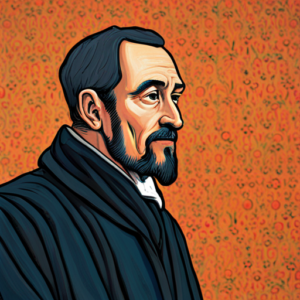 The authors certainly do not shy away from the role that John Calvin played in Michael Servetus’s persecution and execution. It offers a nuanced look at the religious and political context in which these events unfolded.
The authors certainly do not shy away from the role that John Calvin played in Michael Servetus’s persecution and execution. It offers a nuanced look at the religious and political context in which these events unfolded.
The authors do critique Calvin’s actions and the ways in which he used his power and influence to suppress dissenting voices. They also explore the ways in which Calvin’s views on religious and political power intersected with his actions towards Servetus.
However, it is important to note that the book does not reduce Calvin to a caricature of a “horrible person.” The authors acknowledge Calvin’s immense impact on the Reformation and his contributions to theology and philosophy. They also recognize that his legacy is complex and multifaceted. The book’s aim is not to condemn Calvin outright but rather to provide a fuller understanding of his role in the events surrounding Servetus’s execution.
Overall, “Out of the Flames” provides a balanced and nuanced portrayal of the individuals and ideas that shaped the Reformation era. While Calvin’s actions towards Servetus are certainly not glossed over, the book does not reduce him to a simplistic character foil. Rather, it examines the complex web of religious, political, and intellectual forces that contributed to the story of Michael Servetus.
Summary
“Out of the Flames” by Lawrence and Nancy Goldstone is a captivating and thought-provoking work of historical narrative. Through their skilled storytelling and deep historical research, the authors trace the life, ideas, and persecution of Michael Servetus. The book provides a nuanced look at the complex religious, political, and intellectual forces that shaped the Reformation era, and the individuals whose ideas continue to shape modern discussions of religious pluralism and intellectual freedom.
One of the book’s strengths is its meticulous attention to historical detail. The authors weave together a wide range of primary and secondary sources to paint a rich and compelling picture of the times and events surrounding Servetus’ execution. The book’s vivid descriptions of the people, places, and ideas that shaped the era are not only informative but also highly engaging and easy to read.
Overall, “Out of the Flames” is a must-read for anyone interested in the history of ideas, religious dissent, and intellectual freedom. The book offers a compelling narrative of one man’s struggle for his beliefs, and the ways in which his legacy continues to resonate today.
Highly recommended.
No products found.
No products found.
As one of Jehovah’s Witnesses, I enjoyed it immensely and feel that it is a well-researched and thought-provoking read for anyone interested in individuals like William Tyndall and Servetus who valued the Bible during the Reformation as well as the history of religious thought and practice.
I saw a view about Michael Servetus on jw.org and decided to read this book to learn more about him and the Reformation and John Calvin’s brutal persecution of lovers of truth.
Out of the Flames is an incredible book that tells the story of Michael Servetus, a lesser-known historical figure who had a significant impact on science and religion. The authors, Lawrence and Nancy Goldstone, bring Servetus and his world to life with their superb storytelling skills and impeccable research.
The book is a fascinating read, taking the reader on a journey through the 16th century, exploring the volatile world of religion, and presenting Servetus’ contributions to science. This book provides insight into the dark religious conflict and persecution Servetus faced, making it a heartbreaking yet inspiring read.
The Goldstones’ writing is engaging and captivating, making it hard to put the book down. They provide the reader with an educational and entertaining experience that leaves one with a newfound respect for Michael Servetus’ legacy.
Overall, I highly recommend Out of the Flames to anyone interested in history, science, and religion. The book is informative, riveting, and thought-provoking. It is an excellent read that will stay with you for a long time.